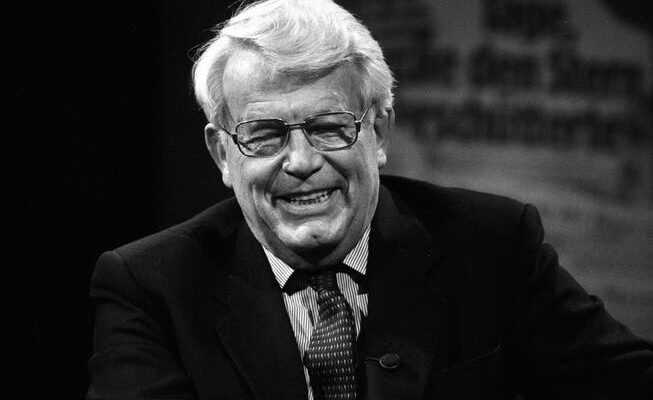The Norddeutscher Rundfunk showed some of the leaflets that the later publisher was responsible for as head of an SS propaganda company. There is little that is new. But the question of why he was considered a journalistic luminary for so long is posed with new urgency.
Henri Nannen, here during a TV appearance on January 1, 1984.
Even 77 years after the end of the war, the Nazi era has not yet been fully worked through. However, not everything that is presented to the public as a sensational discovery is actually new and surprising: It has long been known that Henri Nannen, the founder and long-time editor of the magazine Stern, who died in 1996, served the regime as a journalist. Nannen was a stadium announcer at the Olympic Games in 1936, he reported as a war reporter from the Eastern Front, and in Italy he headed a propaganda company intended to encourage American soldiers to desert.
What he produced there, in the “Südstern” department of the SS, journalists from Norddeutscher Rundfunk (NDR) have now taken a closer look: Some of the leaflets are in the manuscript department of the Berlin State Library, as was already read in the “Süddeutsche Zeitung” in 2010. The content of the concoctions is not surprising: they are the absurd motifs of Nazi propaganda, such as a rich Jew attacking a blond woman, or someone who puts a soldier through a meat grinder with money coming out of the back. The brave GI, according to the statement, will be burned up in a war that is backed by world Jewry.
Many journalists soiled themselves during the war
A reassessment of Nannen’s activities in the Second World War is not necessary after the re-publication of the documents; “Stern” also wrote about “perfidious formulations” in 2014 in the pamphlets published by its later founder. The fact that the NDR makes the documents accessible to the public is nevertheless commendable, since historiography always thrives on clarity.
It is unclear whether Nannen wrote the texts for the leaflets himself, but they were his responsibility. After the war he stated that he had never been a member of the SS or the NSDAP. He concealed his “Südstern” activity. This gave him a much better starting position than many a simple party member who had been far less involved in the atrocities of the Nazis.
As a former Nazi propagandist, the “Stern” founder was anything but an isolated case among the leading journalists of the early Federal Republic. Paul Sethe, one of the founding editors of the Frankfurter Allgemeine Zeitung, wrote a hymn to Adolf Hitler in 1933; Werner Höfer, the television director of the Westdeutscher Rundfunk, or Josef Müller-Marein, the third editor-in-chief of the “Zeit”, had supported the Nazis in a journalistic manner, among many others.
Did Nannen get a moral discount?
However, their names should only be known to people with an above-average historical interest. Nannen, on the other hand, is still a household name today: a journalism school and a journalism award are still named after him, both of which are among the most renowned of their kind in Germany. A renaming would actually have been appropriate years ago; whether she will finally come is an open question.
The fact that Nannen, unlike the German chancellor Kurt Georg Kiesinger, for whom his NSDAP membership cost him some reputation, escaped scot-free during his lifetime was probably also due to his political views. His “Stern” always wanted to be more than just the family newspaper that brought colorful pictures into the living room: “Stern” was also political, it was left-liberal and supported Willy Brandt’s Ostpolitik, for example. This may have prompted some to give Henri Nannen a moral discount.
